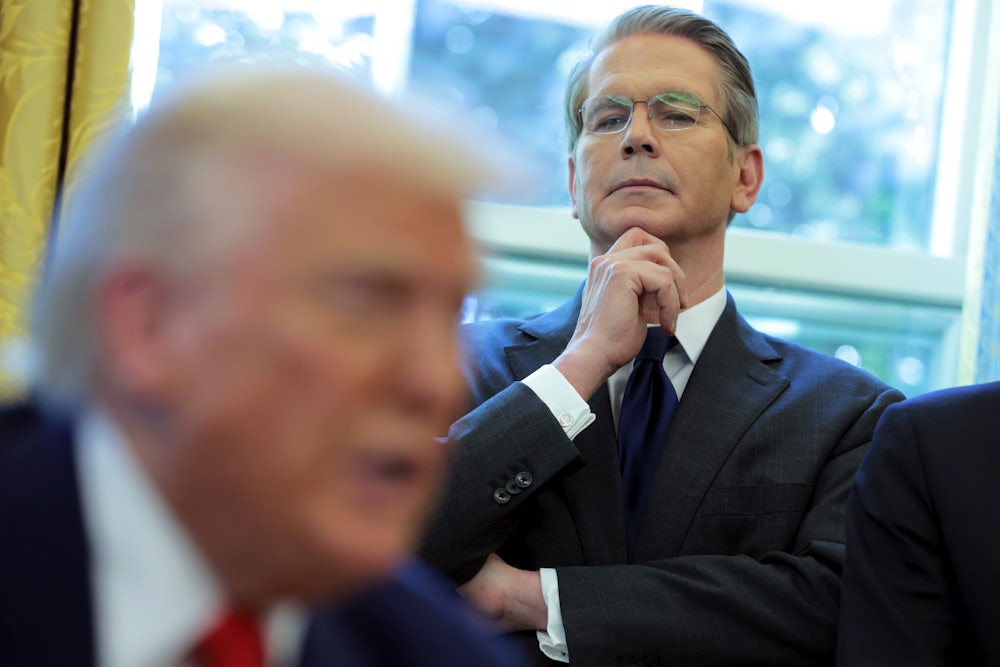Scott Bessent is having a moment. “Wall Street’s Best Hope to End Trump’s Global Trade War Is One of Its Own,” says The Wall Street Journal. “Bessent Emerges as Man of the Hour Trade Negotiator,” says Bloomberg. “Bessent has emerged as a potential savior, the most senior official standing between Trump and a full-blown global trade war,” explains the Financial Times. But the treasury secretary isn’t going to save us from President Trump’s tariff rampage, and Bessent’s messianic campaign to remove government spending from the private economy will, if Trump embraces it, make everything worse.
Last week, I argued (“Everybody Hates Howard Lutnick”) that the commerce secretary had outmaneuvered Bessent by persuading Trump to impose ruinously high “reciprocal” tariffs on pretty much the entire world. The following day, Trump backed off, announcing a 90-day suspension of the reciprocal tariffs and putting Bessent in charge of negotiating tariff reductions with other nations. The delay prompted the business press’s aforementioned hosannas for Bessent. Everybody loves Bessent to roughly the same degree that everybody hates Lutnick.
But is Bessent riding to the rescue? Various other damaging tariffs remain in place, including a baseline 10 percent tariff against all nations; a 25 percent tariff against foreign-made cars, steel, and aluminum; a somewhat porous 25 percent tariff against Canada and Mexico; and a 145 percent tariff against China. The latter prompted me to run out last week to replace my MacBook Air, iPhone, and iPad in anticipation of their prices soon rising by 145 percent. Then the Trump administration announced late Friday an exemption to the China tariffs for electronics, smartphones, and computers. That made me feel a little silly.
Then Lutnick said Sunday that this electronic exemption was only temporary and that all these items would soon be subjected to “semiconductor tariffs.” A few hours later Trump himself said on Truth Social, “There was no tariff ‘exception’ announced on Friday.” This last statement contradicted not only an announcement from Trump’s own U.S. Customers and Border Protection agency but also an executive order that Trump himself issued Friday. That made me think I’d been right to upgrade my Apple products after all.
It also made me think Bessent, though much more moderate on trade than Trump, Lutnick, or White House aide Peter Navarro, won’t be in charge of trade policy after all. Neither will the Customs and Border Protection agency, and neither will Trump himself. Nothing will ever be decided because (to put it charitably) Trump changes his mind constantly or (to put it less charitably) Trump is too ravaged by mental illness and cognitive decline to have much of a mind to change. On Friday, the same day Trump issued that executive order, the White House released a glowingly favorable report from Trump’s personal physician, Sean Barbabella, that claimed “no abnormalities in his mental status” and a perfect score on the Montreal Cognitive Assessment. And yet, Trump can’t recall an executive order he signed two days earlier.
It’s not clear that Bessent is in charge of other economic policies. Back in October, he told the Financial Times that he did not believe that, if elected, Trump would try to devalue the currency. “I believe that if you have good economic policies, you’re naturally going to have a strong dollar,” he said. But Trump had said already on X: “As your President, one would think that I would be thrilled with our very strong dollar. I am not! The Fed’s high interest rate level, in comparison to other countries, is keeping the dollar high, making it more difficult for our great manufacturers like Caterpillar, Boeing.…”
After Trump won the election, he installed as chairman of his Council of Economic Advisers Stephen Miran, who explicitly called for devaluing the dollar in a much-discussed November memo, and as recently as last week repeated that commitment. Bessent said at his confirmation hearing that tariffs strengthen the dollar, and that a (then-hypothetical) 10 percent everything tariff would cause the dollar to appreciate by 4 percent. I questioned Bessent’s zany precision at the time, but even I never expected Trump’s tariffs to weaken the dollar. Yet that’s what they did (inadvertently) as a result of being applied so haphazardly as to weaken international confidence in America’s stability. The dollar has depreciated against other currencies 8.5 percent since Trump’s inauguration—not because the U.S. is in control of the global economy, as Miran’s famous memo presumes, but because the U.S. can’t control even its own economy.
It’s much the same with the bond market, which was in bad shape before Trump imposed the tariffs and is in worse shape now. How is that possible? It’s axiomatic that when the stock market tumbles, people move their money into bonds, which are more secure. But that didn’t happen during the tariff-induced stock drop (which may not be over). Instead, there was a bond sell-off because, as the Brown political economist Mark Blyth told The New York Times, “The whole world has decided that the U.S. government has no idea what it’s doing.” It’s worth noting that this is happening even though neither Trump nor Miran has yet carried out threats to give Treasury bondholders a haircut.
To summarize: Tariffs, the stock market, the bond market, and the dollar are all out of control, all on Bessent’s watch. If this is Wall Street’s Best Hope, I shudder to think what its worst nightmare looks like.
Well, you say, it’s hardly fair to judge Bessent by policies he doesn’t get to control, even when the Trump White House claims he controls them. Unleash Bessent, and all will be better.
But that formulation ignores the crazy stuff Bessent believes. It’s different stuff from Trump’s, but crazy all the same. “In a trade context,” Victoria Guida writes in Politico, “he is viewed as a moderating influence on Trump’s most aggressive trade impulses. But on matters of debt, Bessent has the potential to be more of a hard-liner.”
As I’ve explained elsewhere, Bessent is that rare bird, a conservative who sneers at prosperity. This niche ideological strain used to occupy a larger place in conservative thought, but Ronald Reagan pretty much extinguished it. Candidate George W. Bush briefly brought it back to life during the 2000 campaign so he could crap on the tech boom under President Bill Clinton. But after that, Prosperity Sucks conservatism all but vanished until Bessent came along.
To Bessent, the prosperous economy Trump inherited from President Joe Biden was bad because it was fueled by government spending. Never mind that, as Guida notes, government spending as a share of gross domestic product is fairly low right now (after spiking during Covid). Bessent finds repellant the whole idea that government spending plays any role in GDP. He wants to put the economy in “detox” through radical reduction of government spending.
Bessent explained all this in his first major address as treasury secretary, at the Australian Embassy, back in February—a transcript of which, weirdly, has never been posted to the Treasury Department’s website. Bessent argued in the speech that Biden put the economy into a “private-sector recession,” which sounded like he meant “all sectors except the government sector.” But if he’d meant that, it wouldn’t have been true. So Bessent said he was talking about “government and government-adjacent sectors” (my italics), a fudge that allowed him to ignore the health sector, which is the largest single industry in the United States. “This is about more than just reducing the fiscal deficit,” Bessent said, effectively conceding that such a goal will never be met under Trump because of his planned $5 trillion in tax cuts.
Bessent wants to cut government spending because, he says, “the market and the economy have just become hooked, and we’ve become addicted to this government spending.” Bessent doesn’t dispute that government spending can contribute to economic growth. He just thinks it’s drug-addicted economic growth. It’s not the kind of economic growth you want your sister to marry.
This is a nuttiness quite apart from Trumpism. No, Bessent isn’t coming to save the economy. He can’t do what Wall Street wants, and his idée fixe of excising government spending from the economy would wreck it just as surely as Trump is doing now.






